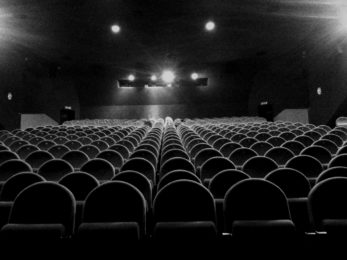Cinema-going, and every other type of entertainment that we consume on a large scale, has had to shut it’s doors. People are craving the social aspect that art brings to our communities and cultures. How will the world shift in a post-pandemic environment?

Going to the movies is an iconic pastime, a luxury that has come to a screeching halt. You’re either someone who relishes a jam-packed cinematic experience— this one’s bound to be good, it’s a full house!— or you prefer an empty, quiet cinema— now we can laugh and talk about what’s happening to our heart’s content. Either way, it’s an experience we enjoy. It’s something many do on a bi-monthly basis, in order to keep our lives nuanced.
However these days life is shifting to anything but. Cinemas, jam-packed or not, are certainly a breeding ground for COVID-19, as are any public space. So we’re stuck inside, with all this spare time, daydreaming of a trip to the movies: a bucket of soggy, over-salted popcorn, Malteasers poured right in (haters will shake their heads, but it’s a classic move), a frozen coke by our side. Plus, the dramatic and enthralling experience playing on the big screen. I think that’s what we miss most, the enormity and scale of the collective picture before us.
Watching Netflix and other streaming sites from the comfort of one’s home is of course incomparable. Though they’ve responded to the demise in movie-going and released 50 new titles this month, keeping us entertained is a battle producers have had to tackle with open arms. People are always demanding something new and cutting edge, and during this time of stress and idleness, we’re all searching for something to give us some peace. Or even the opposite, something completely wacky to distract us from the craziness that is our globe in 2020 — Tiger King, anyone?
Here at FIB, we recently took a look at what films are set to be postponed, what productions are taking a halt and if any films will skip the theatres and head straight for streaming sites. While we can understand that all industries and businesses are making economic decisions to keep them afloat and please their client base, I think most of us are holding out for “things to return to normal”, where we will be re-flooded with epic films and have our weekends back-to-back ready to spend together at the cinemas.
However, at this point we don’t know when things will actually go back to normal, or if they’ll ever be normal again. Life post-coronavirus is going to be a shock to the system. It’s anybody’s guess, when will we even arrive at a point where the spread is fully contained and large, social gatherings are no longer something to fear?
NOT JUST CINEMA:
Entertainment, as a whole, will take a huge shift to a direction unknown. Cinematic experiences are just one sector in that paradigm that’s suffering. Take a look at music festivals, or any kind of live-show for that matter. Films, music, theatre — they’re not just about the content displayed before us but, like all good art, make us feel and question, to better understand who we are and why we’re here. They’re about the coming together of people. A shared experience. A collective understanding.
What is a great film at the movies, or a curated lineup of the best acts, without friends to experience it with? Discussing art and entertainment is what gives it that extra dimension, rendering it a condoned masterpiece. The way we experience entertainment, and certainly the art we will be consuming it post COVID-19, is going to see a huge paradigmatic shift.

IS THE NEW WORLD NEAR?
Australia and many other countries around the globe still have a solid road ahead of them before this post-life becomes a reality. Yet China, where the virus first originated, has apparently entered that shaky stage already. The city of Wuhan, coronavirus epicentre, has reportedly had five consecutive days without a new outbreak.
While the figures are dropping from peak results a mere month ago, authorities are easing up on the lock down laws and slowly shifting back to “normal life.” There’s a rush for things to continue as they once did, but in their zeal there’s growing the fear that officials are prioritising the economy over the health of the people. The Chinese are not alone in this; other international citizens are feeling it too, and rightly so.
People ache for things lost: community, entertainment, art, shared experience; realms of our lives that we took for granted. The questions surrounding them have changed. When will be allowed to experience these things again is now becoming also, how will we experience them? And not even just how, but what?
When devastation and tragedy strikes our globe, it inevitably leaks into the content, art and entertainment we consume. Life post-pandemic sure will be interesting in many ways, but I for one, will still be looking to the entertainment sector for guidance, solace and relief.
Subscribe to FIB’s Weekly Alchemy Report for your weekly dose of music, fashion and pop culture news!






